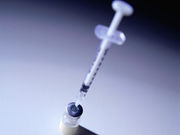Two-pronged approach tested on lab monkeys, guinea pigs
FRIDAY, Jan. 20, 2017 (HealthDay News) — A new vaccine for herpes simplex virus type 2 could be nearing human clinical trials, according to research published online Jan. 19 in PLOS Pathogens.
The new trivalent vaccine targets three different parts of the virus, shutting down its ability to enter cells and to evade detection by the immune system, senior author Harvey Friedman, M.D., a professor with the University of Pennsylvania School of Medicine’s Institute for Immunology in Philadelphia, told HealthDay. The new vaccine induces an immune response that produces three antibodies targeting different aspects of the genital herpes virus. Two of the antibodies prevent the virus from blocking the immune system, while the third prevents the virus from entering cells, the researchers said.
In lab studies, the vaccine proved 98 percent effective in protecting guinea pigs against genital herpes infection, Friedman and his colleagues reported. The vaccine also promoted an immune response in monkeys, increasing the levels of antibodies targeting the virus.
“In essence, we’re stimulating the immune system to attack the virus and at the same time preventing the virus from using some of the tools it has to thwart that immune attack,” Friedman said. Friedman pointed out that incorporating two different attacks into a single vaccine is a “novel strategy” that may revolutionize the field. “It may be a new era of vaccines,” Friedman added. “This could open up the field to other viruses that are using evasion strategies that are different, but the same concepts could be applied.”
Full Text
Copyright © 2017 HealthDay. All rights reserved.








